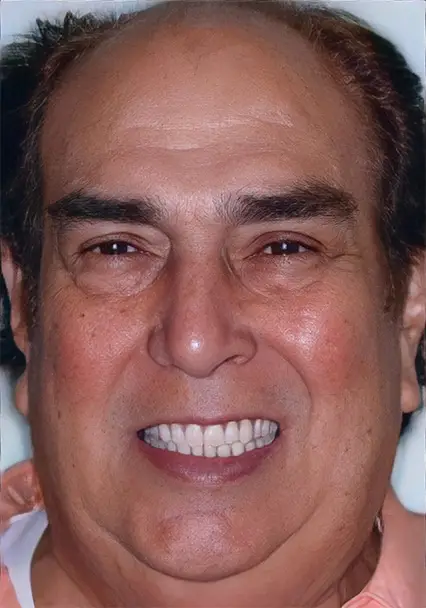Home / Dental Services / Wisdom Teeth Removal
Wisdom Teeth Removal in Miami, FL
Wisdom teeth removal is a common procedure performed by dentists to remove the third molars. These teeth usually come in at age 17 or 18, and if they haven’t erupted completely, they can cause problems. Gallardo Periodontics and Implants offers routine and effective wisdom teeth extraction in Miami, Florida.
Wisdom Teeth Removal Benefits
01
Prevention of Impacted Teeth
Wisdom teeth often lack sufficient space in the mouth to erupt properly, leading to impaction. Removing impacted wisdom teeth prevents potential pain, infection, and damage to adjacent teeth caused by their improper growth.
02
Reduction of Crowding and Misalignment
Removing wisdom teeth can prevent crowding and misalignment of existing teeth. By eliminating the pressure exerted by the wisdom teeth, the risk of shifting or overlapping teeth is reduced, maintaining a straighter smile.
03
Prevention of Oral Complications
Wisdom teeth can be challenging to clean properly, increasing the risk of decay, gum disease, and infections. By removing the wisdom teeth, individuals can better maintain their oral hygiene and reduce the likelihood of oral health complications.
They perform the procedure using local anesthesia and sedation. After removing the tooth, they clean the gum tissue and place a healing cap on the site. Patients typically feel no pain during the procedure. After the surgery, patients may experience swelling, bruising, soreness, and discomfort. However, most patients recover quickly after the procedure.
Healthy, well-aligned wisdom teeth used to be a vital tool for humans, one that allowed our ancestors to eat coarse, hard foods like wild grains and roots. However, with the advent of modern agriculture, this last set of molars has become unnecessary. Today, our wisdom teeth often cause more problems than they solve.
Over the years, the human jaw has gradually become smaller, which often results in the wisdom teeth becoming impacted. In some cases, they only erupt partially, creating a breeding ground for dangerous bacteria. Gallardo Periodontics and Implant Dentistry offers routine and effective wisdom teeth removal in Miami, Florida.
Here’s what you need to know about when wisdom teeth removal is necessary, the removal procedure, and recovery tips for after surgery.

When is a Wisdom Teeth Removal Necessary?
If you have wisdom teeth (and not everyone does), you will start to notice them between the ages of 17 and 25 years of age. Problems will only emerge if your tooth/gum formation does not leave enough space for the tooth or teeth to come in naturally. When this occurs, the wisdom teeth will often become impacted, causing infection and pain.
As a preventative measure because impacted wisdom teeth can cause a number of dental issues including:
- Pain caused by the wisdom tooth getting trapped within the jawbone of the gums
- Tooth decay of an embedded and partially-erupted wisdom tooth
- Damage to any connected teeth
- Orthodontic problems with jaw and tooth alignment
- Infection surrounding the wisdom tooth known as pericoronitis
A dentist will usually choose wisdom tooth extraction if they believe future dental problems are imminent and could be prevented by removing a wisdom tooth or teeth. Infection, damage, tumors, and cysts from impacted wisdom teeth are so common that over 85% of adults eventually need to have their wisdom teeth removed.

How To Prepare for Wisdom Tooth Extraction Surgery
Before your wisdom teeth are removed, you’ll go through a consultation and examination process to determine the proper course of treatment. Fully-erupted wisdom teeth can be extracted like any other tooth, but in many cases, the teeth will be only partially erupted or not erupted at all so the procedure will need to be more intensive.
In the event of a partially erupted tooth, the extraction will be performed under IV sedation or using a local anesthetic with a sedative to keep you relaxed and comfortable. An incision will be made in the gum over the tooth, and a portion of the bone that covers the impacted wisdom tooth will be removed to allow access. The tooth will be removed in sections if necessary to minimize the disturbance to your jawbone.
Wisdom tooth extraction is a surgical procedure, meaning that patients are required to follow certain protocols prior to surgery. Be sure to carefully review your dentist’s written instructions for pre-op preparations.
Prior to your surgery, you will most likely be required to:
- Avoid taking any non-prescription medications
- Avoid eating or drinking for several hours
- Arrange transportation for after the surgery
Wisdom tooth extraction surgery is considered quite routine by most dentists, but it’s still a surgery and comes with some risks. If you are a candidate for wisdom teeth removal, start by asking your dentist a lot of questions to make sure that you feel comfortable and confident about the surgical process.
Common questions and concerns include:
- Procedure length
- Concerns about anesthesia
- Recovery times
Asking questions allows you to build trust in your dentist/oral and maxillofacial surgeon, which should help mediate any anxiety you might feel about the procedure.
Talk to a Skilled Dentist
DR. GALLARDO HAS ADDED ORAL SURGERY
If your dentist has recommended having your wisdom teeth removed, the sooner you have them extracted, the better. In Miami, Dr. John Paul Gallardo has recently added oral surgery and wisdom teeth removal to his practice. To find out more about your options, contact our office at our phone number: (305) 547-8896 today to schedule a consultation.
Wisdom Tooth Extraction Recovery Process
While the surgery itself is painless due to the use of anesthetic and sedatives, the recovery might not be. The length of your recovery will partially depend on your ability and willingness to follow the dentist or oral surgeon’s post-op written procedures.
Some pain, swelling, and bruising are completely normal in the days following your surgery. You should be able to address the majority of your pain with over-the-counter medications. If not, you can request prescription pain medication.
Sometimes, recovery takes a little longer due to complications. A few of the most common complications are dry socket, paresthesia (nerve damage after wisdom teeth removal causes numbness in the lower jaw), swelling, and sharp edges on the remaining bone.
On average it can take up to two weeks to fully recover from wisdom teeth removal and complications could extend that timeline. As long as you follow the advice and instructions of your dentist/oral surgeon, you should be back to normal in no time at all.

What To Eat
For proper recovery, it’s essential to know what foods you can eat after a wisdom tooth extraction.
For the first 24 hours or so, you’ll want to stick with liquid foods, such as ice cream, smoothies, or yogurt. After about a day, you can begin to eat more solid foods like eggs, potatoes, and avocados.
Stick with a soft-food diet for about a week, or until your oral surgeon gives you the go-ahead to eat tougher foods. When you begin to eat more solid foods again, try to minimize chewing as much as possible by cutting your food into very small pieces.
Temperature can also irritate your healing gums after oral surgery. Generally, people find that it’s more comfortable to eat cold food and drinks while recovering.
Hot food and beverages can irritate your gums. You might also want to avoid spicy foods, carbonated beverages, caffeine, and alcohol while you heal.
Handling Discomfort
Everyone has a different pain threshold. One person’s recovery might be almost unbearable, while another person may experience minimal pain or discomfort.
Your surgeon will most likely prescribe some form of pain reliever. Some surgeons prescribe narcotic pain relievers or stronger doses of ibuprofen, acetaminophen, or both.
It’s important to take the medications as directed. If you aren’t comfortable taking narcotic pain relievers, prescription-strength acetaminophen or ibuprofen are suitable alternatives.
Oral Care During Recovery
Your mouth will most likely be tender after the surgery, which can make cleaning your teeth and gums a bit of a challenge. In many cases, you’ll be advised not to brush your teeth, floss, or rinse for the first 24 hours after surgery. After that, you can brush but do so gently, particularly around the area where the teeth were removed.
After 24 hours, your surgeon will most likely recommend rinsing your mouth with a saltwater solution. Use the rinse every few hours and after you eat or drink. The saltwater rinse will help by washing away debris from the area, keeping your mouth moist, and minimizing swelling and discomfort.
Common Post-Op Wisdom Tooth Extraction Side Effects
Dealing With Bleeding
Bleeding is inevitable after your wisdom teeth are removed. It’s likely that the surgeon will give you a piece of gauze to place over your gums. Replace the gauze as needed.
If you run out of gauze before the bleeding stops, try placing a cold tea bag over the area. Tea contains vasoconstrictors that can help reduce bleeding.
What you don’t want to see is persistent bleeding. If this occurs, contact your dentist as soon as possible.
Avoiding The Chipmunk Look
In many cases, swelling is at its worst two or three days after the procedure. For a few days after the surgery, do your best to keep your head elevated to help fluid drain away from the face and reduce bleeding.
Sleeping after dental extraction surgery can be particularly uncomfortable. To keep from waking up with chipmunk cheeks, use an extra pillow to elevate your head for the first few nights.
Putting an ice pack or cold compress on your jaw, outside of your mouth, can also help minimize swelling. Your surgeon can give you advice on positioning the ice pack for the best results.
Dry Socket
Dry socket occurs in up to 10% of wisdom teeth extraction cases. Normally, a dry socket occurs when a blood clot in the lower jaw either falls out or fails to form. This is characterized by increased pain 3-4 days after the procedure and requires medication to be placed in the socket.
At Gallardo Periodontics and Implant Dentistry, we take an extra step to improve the healing process by using growth factors from the patient’s own plasma to prevent dry sockets.
Habits To Avoid
Some habits should be avoided for a few days or weeks after your surgery. Your maxillofacial surgeon will most likely tell you to avoid straws. The suction and force of straws can dislodge the blood clot that forms over the healing gums, resulting in a dry socket.
Smoking is another big no-no after your surgery. Like using a straw, smoking increases your risk for dry sockets. It also delays healing by limiting blood flow to the gums.
Our Work Speaks for Itself
What Our Patients Say
Committed to your results

Why Choose Dr. Gallardo for Your Wisdom Teeth Removal
- Dr. Gallardo has 30 years of experience offering dental implants and specialized periodontics to patients throughout South Florida.
- Dr. Gallardo is a graduate from the University of Miami and received his Doctor of Dental Surgery degree from New York University College of Dentistry.
- Accepted into the V.A. Medical Center General Practice Residency Program of the U.S Department of Veterans Affairs where he was honored with the “Outstanding Resident of the Year” Award.
- He has lectured nationally and internationally to dentists and hygienists and has been sponsored by companies such as Procter and Gamble to speak on clinical topics related to gum disease and implant dentistry.
- Dr. Gallardo remains a leader in periodontics and implant dentistry through his active and past involvement with University of Florida, Florida Association of Periodontists and North American Society of Periodontists.
Wisdom Tooth Extraction FAQs
Should I wait to have my wisdom teeth removed?
In most cases, it’s best to schedule an exam as soon as you suspect that there might be a problem. Wisdom teeth extraction could potentially have complications when performed on older patients.
How do I know if my wisdom teeth are impacted?
For most patients, the primary symptom is pain, which can be quite severe. The pain may extend to the inner cheek if the cusps of the impacted teeth dig into the cheeks. Your gum tissue may swell, and it might be difficult to open your mouth. In some cases, you’ll also have bad breath or a bad taste in your mouth from an accompanying infection.
What is recovery like?
The bulk of the recovery is normally over within a week, although the area where the tooth is extracted will not be fully healed for at least 3-4 weeks. You will experience some bleeding for the first day or so, but some gauze can help to minimize this. There will also be swelling and some discomfort, although you will be prescribed painkillers. In order to minimize complications, you’ll need to stick to a soft diet for several days and rinse the socket with warm saltwater daily for up to a week.
Do I need to have all of my wisdom teeth removed if only one is impacted?
It’s certainly possible to only remove one or two wisdom teeth during the procedure, but most patients will be best served by having all of them removed at the same time since it’s so likely that they will cause problems later.
What wisdom teeth removal office is near me?
If you live near Miami, FL, Gallardo Periodontics and Implant Dentistry offers wisdom teeth removal among its services, and is conveniently located at 2020 SW 27th Ave Miami, FL 33145.









